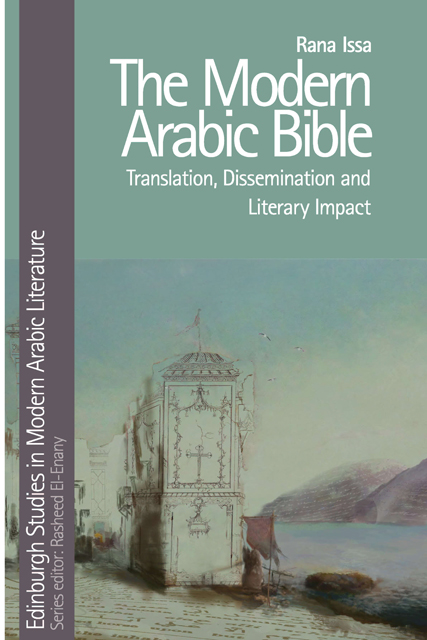Book contents
- Frontmatter
- Contents
- List of Figures
- Series Editor’s Foreword
- Acknowledgements
- Note on Transliteration and Abbreviations
- Dedication
- Introduction
- 1 The Missionary Bible
- 2 Bible Competition
- 3 Standardising Arabic
- 4 Butrus al-Bustani as Translator
- 5 Ahmad Faris Al-Shidyaq’s Bible as Literature
- Conclusion: In the Beginning was Translation
- Bibliography
- Index
Conclusion: In the Beginning was Translation
Published online by Cambridge University Press: 02 June 2023
- Frontmatter
- Contents
- List of Figures
- Series Editor’s Foreword
- Acknowledgements
- Note on Transliteration and Abbreviations
- Dedication
- Introduction
- 1 The Missionary Bible
- 2 Bible Competition
- 3 Standardising Arabic
- 4 Butrus al-Bustani as Translator
- 5 Ahmad Faris Al-Shidyaq’s Bible as Literature
- Conclusion: In the Beginning was Translation
- Bibliography
- Index
Summary
I remember the days of old;
I meditate on all that you have done;
I ponder the work of your hands.
Psalm 143:5
When the Bible began to proliferate in vernacular translations around the world of ancient antiquity, it was not language that the churches cared for, but the capacity of the church and its adherents to interpret the Bible within accepted creeds. Nevertheless, biblical translation has been at the root of many of the schisms that would befall the ancient, as well as the modern churches, and that ultimately caused the creation of various sects within Christianity. Until the nineteenth century, the place of translation in the history of Christian churches has been an internal matter, of relevance only to the Christian nation. With the advent of nineteenth-century colonial rule, this history gained importance, particularly because European colonialism provided opportunities for Protestant and Catholic missionaries to spread newly-translated vernacular Bibles around the world. These Bibles, as I have shown through studying the Arabic case, rose to prominence as key modern texts that were part of a sweeping moment of language synchronisation around the world, constructing kinship ties with languages that previously had little to do with one another.
With the American ability to produce cheap Bible editions, translations became available on the book market and had an impact beyond the ready audience of local Christians who were the immediate target buyers for these objects. This impact has led to a dominant narrative that the Bible modernised Arabic language and literature and caused its revitalisation and its nahda. I have argued in this book for the necessity of more nuance, if we are to better understand what the concept of ‘modernity’ entailed when applied to Arabic and to Bibles. I have instead claimed that the standardisation that Arabic underwent in the modern Arabic Bibles departed in style and glossary from the tradition of Biblia Arabica that includes hundreds of translations of the Bible into Arabic. This departure led to a concomitant change in the conceptualisation of grammar and lexicon, how we conceive of these as sciences that can be taught to children and adults. I also argued that these are sciences that exert much political force in enabling certain master narratives to permeate the structure of language and how it is taught.
- Type
- Chapter
- Information
- The Modern Arabic BibleTranslation, Dissemination and Literary Impact, pp. 214 - 218Publisher: Edinburgh University PressPrint publication year: 2023



